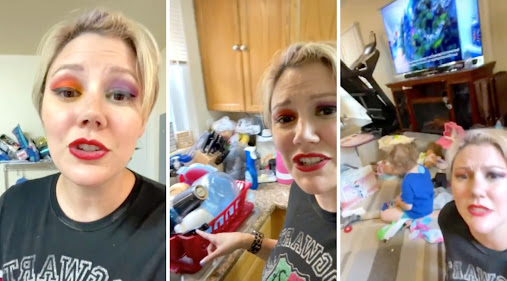Why are momfluencers so good at worming their way into your brain ?
AND maybe there are better online models of motherhood than the ones supported by the biggest advertisers : Like Emily Feret, who goes by @emilyjeanne333 on TikTok, has 1.1 million followers and 36.4 million likes as of this writing.
She's a 29-year-old stay-at-home mom of two, and she makes delightful videos that send up the unattainable perfection found elsewhere on social media.
MS. FERET said she want to ''normalize normal'' and she's done a series of videos taking the viewer on a tour of her house, showing ''life without the filter.'' Her kids are always in the background.
''Levi, son, dear God, get out of the trash can,'' she says with a smile in one. ''Please stop going in there. You're disgusting. Then she shows us her lamp., which is still in its original plastic. ''There's dead bugs stuck in there!''
In some ways, the Internet has been incredible for mothers. Spaces online have provided solace and connection and allowed some women to have a public voice in communities that otherwise stifle them.
It's also a trove of practical tips. [ Any solid guidance on installing a car seat is worth its weight in gold.]
THE INTERNET is also much of the reason that I have a career writing about motherhood. Until I started working for The Times in 2018, almost every full-time job I had was for an online publication, and most of them were geared toward women.
My work has allowed me to connect with all different kinds of parents through comment sections and social media, giving me a richer understanding of what's like to be a 21st century American mom.
And yet when women write about how mothers can't live up to the unreasonable and often nonsensical ideals of our culture, they often get flak for even mildly threatening the status quo.
Whenever I have written about my struggles or those of other mothers to meet untenable expectations during the pandemic. I've received blowback about how we shouldn't be complaining, because having kids was our choice and should be our full responsibility.
THERE'S A GROUP of women on the Internet who exist in contrast to the struggling moms who spent Covid qurantines screaming: momfluencers, women with social media followings in the tens of thousands or even millions who offer tips and inspiration to their fellow moms.
They're often selling something through advertiser-sponsored posts - that's how they earn money -whether it's makeup, cookware or their parenting courses or workout routines.
These mothers seem to be permanently happy with their children. Whenever they refer to mental health or parenting difficulties, those problems are in the past. Their postpartum depression or a family death or their child's issues at school have been solved, juxtaposed with a beautiful image of open hands or a serene lake.
The influencers who show up most often in my algorithm often have a domestic or classically feminine inclination beyond motherhood - like beauty, clothing or home decor. They're not infrequently blond. Some call themselves trad wives, who emphasize traditional gender roles. Others combine information about babies' sleep or feeding with perfectly curated imagery.
I know these influencers have problems like any parent and that their 2-year-old probably threw a tantrum right before that smiling photo was taken in front of a backdrop of majestic mountains. I also know that they are trying to sell me something.
STILL, I am entranced and shamed. I see their photographs with their sunny captions, and some small part of me believes they are more naturally suited to motherhood. And I know I'm far from alone.
I spoke to around 100 contemporary mothers from all different backgrounds for my book, and many of them talked about their complicated feelings about social media.
Particularly during pregnancy, these women felt that they couldn't live up to the ideal that they saw on Instagram, which one woman described as giving her the ''perception I would feel ecstatic and joyous and I'd be a goddess floating on a cloud.''
When she didn't feel that way, she thought there was something wrong with her. Looking at those influencers' posts is like picking at a scab-painful but somehow irresistible.
Unreal expectations of American moms go back as far as written history : In the colonial days, the ideal was a pious Christian woman who spun cloth with her baby at her heels and helped keep her children on the path to salvation.
Over the next few centuries, new requirements appeared : a focus on creating stalwart American citizens, an education in scientific child-rearing techniques. One thing remains consistent, though.
Despite the work that mothers do to keep families and societies together, our contributions are insincerely praised, ignored or demonized, depending on the time and place and the mother's race, religion and social standing.
The Essay continues. The World Students Society thanks author Jessica Grose, a writer for Opinion and the author, most recently, of ''Screaming on the Inside : The Unsustainability of American Motherhood,'' from which this essay is derived.

.png)


0 comments:
Post a Comment
Grace A Comment!